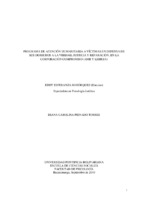| dc.contributor.advisor | Director. Bohórquez, Eddy Esperanza | |
| dc.contributor.author | Peinado Torres, Diana Carolina | |
| dc.coverage.spatial | Seccional Bucaramanga. Universidad Pontificia Bolivariana. Escuela de Ciencias Sociales. Facultad de Psicología | spa |
| dc.coverage.temporal | 2010 | |
| dc.date.accessioned | 2013-12-10T15:49:27Z | |
| dc.date.available | 2013-12-10T15:49:27Z | |
| dc.date.issued | 2013-12-10 | |
| dc.identifier.uri | http://hdl.handle.net/20.500.11912/1337 | |
| dc.description | 123p.: (pdf); il; gráficas; tablas; anexos | spa |
| dc.description.abstract | El contenido de este informe inicia con breve descripción sobre los orígenes de la Atención Humanitaria y según (RIEFF, 2003), éste se observa en las diferentes formas o acciones que han adelantado diversas culturas para mitigar el sufrimiento humano, como son la caridad, la beneficencia o el asistencialismo. Se podrían ubicar como referentes históricos importantes, el humanitarismo colonial, la guerra de secesión de los Estados Unidos, la Convención de Ginebra de 1864. Por otro lado también se hace referencia a la violencia sociopolítica entendida, como: “… aquella ejercida como medio de lucha Político social, ya sea con el fin de mantener, modificar, sustituir o destruir un modelo de Estado o de sociedad, o también para destruir o reprimir a un grupo humano con identidad dentro de la sociedad por su afinidad social. Política, gremial, étnica, racial, religiosa, cultural o ideológica, esté o no organizado” (CNRR. CRITERIOS PARA LA IDENTIFICACIÓN DEL DAÑO PSICOLÓGICO). A su vez también se presenta un modelo que incorpora el enfoque psicosocial en la Atención Humanitaria, expuesto por (Baró, 1994). El cual opta por una integralidad desde la cual se reconozca la importancia de los abordajes clínicos e individuales de las secuelas emocionales de la violencia, pero a la vez, reconociendo que la extensión y multidimensionalidad de los daños causados requieren, reconocimiento de la atención psicosocial y en salud mental. De igual manera se plantea que la interacción de acciones desde la modalidad planteada y con la participación dinámica de los actores involucrados en éstas, permite crear condiciones de sostenibilidad al acompañamiento psicosocial, constituyéndose en un eje que articule y conecte todas las acciones que se requieren dentro del proceso de apoyo a las víctimas, familias y comunidades, potenciando y promoviendo mecanismos que sean adaptativos para sí mismos orientados a la reconstrucción de un proyecto de vida. | spa |
| dc.description.abstract | The contents of this report begins with a brief description of the origins of the humanitarian assistance and by (Rieff, 2003), it is observed in different ways or actions that different cultures have developed to mitigate the human suffering, such as charity, charity or welfare. Referents could locate important historical colonial humanitarianism, the war of secession from the United States, the Geneva Convention of 1864. On the other hand also refers to the socio-political violence understood as: \"... that exercised as a means of social political struggle, whether to maintain, modify, replace or destroy a model of state or society, or for destroy or suppress human group identity within society for their social affinity. Political, trade union, ethnic, racial, religious, cultural or ideological, whether or not organized \"(CNRR. CRITERIA FOR THE IDENTIFICATION OF PSYCHOLOGICAL DAMAGE). At the same time also presents a model that incorporates the psychosocial approach in the humanitarian assistance as outlined by (Baro, 1994). Which chooses a completeness from which recognizes the importance of clinical and individual approaches the emotional aftermath of violence, but at the same time, recognizing that the extent and multidimensionality of damage require recognition of psychosocial care and mental health. Similarly, the interaction arises from the mode of action raised and with the active participation of the actors involved in them, can create sustainable conditions to psychosocial support, becoming an axis that articulates and connect all the actions required within the process of support to victims, families and communities, strengthening and promoting mechanisms that are adaptive for themselves aimed at reconstruction of a life project. | |
| dc.language.iso | spa | |
| dc.publisher | Universidad Pontificia Bolivariana | spa |
| dc.rights | Attribution-NonCommercial-NoDerivatives 4.0 International | * |
| dc.rights.uri | http://creativecommons.org/licenses/by-nc-nd/4.0/ | * |
| dc.subject | Tesis y disertaciones académicas | spa |
| dc.subject | Derechos humanos | spa |
| dc.subject | Justicia social | spa |
| dc.subject | Indemnización judicial | spa |
| dc.subject | Corporación Compromiso | spa |
| dc.subject | Víctimas | spa |
| dc.subject | Salud mental | spa |
| dc.title | Programa de atención humanitaria a víctimas en defensa de sus derechos a la verdad, justicia y reparación, en la Corporación Compromiso (AMB y Lebrija) | spa |
| dc.type | Práctica | spa |
| dc.rights.accessRights | openAccess | spa |
| dc.type.hasVersion | publishedVersion | spa |
| dc.identifier.instname | instname:Universidad Pontificia Bolivariana | spa |
| dc.identifier.reponame | reponame:Repositorio Institucional de la Universidad Pontificia Bolivariana | spa |
| dc.identifier.repourl | repourl:https://repository.unab.edu.co/ | |


